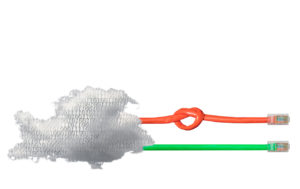
[From last episode: New IoTThe Internet of Things. A broad term covering many different applications where "things" are interconnected through the internet. devices are connected to the cloudA generic phrase referring to large numbers of computers located somewhere far away and accessed over the internet. For the IoT, computing may be local, done in the same system or building, or in the cloud, with data shipped up to the cloud and then the result shipped back down. for the first time in the on-boardingThis is the process of connecting an IoT device for the first time. You connect to a network, and then the device connects "home" for registration and for confirming that the device is legitimate. process.]
Let’s take a moment to discuss current affairs. A week or so ago, the FCC dismantled the net neutralityThe notion that an internet service provider needs to treat all traffic equally, without giving preferential treatment to traffic from specific companies. rules put in place during the previous administration. Let me preface this by saying that I have an opinion, and it will be reflected here. But my intent is for any facts to be correct; I’m not making anything up to support my opinion.
What is Highway Neutrality?
Let’s start from the start. Defenders of not having net neutrality say that this is a really complicated issue that most of us wouldn’t understand — but it’s not. It’s pretty straightforward. (Yes, some of the lower-level details might get complex, but we’re talking the high-level concept here.)
Let’s start with an analogy using highways. Some metropolitan areas have paid express lanes. Depending on the time and congestion, the price varies. To some extent, this might seem like a violation of “highway neutrality,” but it isn’t necessarily. All internet providers have pricing tiers for speed and capacity, so this is kind of like that.
But let’s say that the price for that lane was $5 at some specific time. But let’s further say that, “Drivers of Flord* automobiles pay only $3.” Or perhaps “People with a Safemart Clubby Card pay only $2.50.” You may now want to go buy a Ford car or start shopping at Safemart. Is that because you decided that Flord makes the best cars or that Safemart is the best place to shop? After all, in a market economy, that’s what’s supposed to drive your choice, right?
In this case, that wouldn’t be why you made the choice. You made the choice because the highway authority and some company got together and made a deal. Probably the car or grocery company paid the highway authority some money. So the highway authority is happy; the companies are happy because now you’re more likely to buy their products. But are you happy?
It might not be the worst thing in the world, but it is certainly a distortion of the market. Someone else is making your purchase decisions for you using criteria that have nothing to do with why you like one or the other company.
Net Neutrality
OK, so highway neutrality isn’t really a thing. You knew that, right? But net neutrality is very similar. The folks that control your internet experience – your internet service providerA communications company that provides internet access to homes, phones, or companies. For consumers, this could be the cable company, a phone company offering DSL, or a cellular service provider. (or ISP) – can go out and make deals with deep-pocketed companies to favor their content. Or let’s say one of them owns a content-creation company (like Comcast owns NBCUniversal). It could artificially slow down the video streaming speeds of competing companies.
To be clear, this behavior is the opposite of net neutrality. Neutrality means treating all content equally. Just like your water company doesn’t get to restrict your water pressure based on the brand of appliances you use, neutrality means that you get to choose which websites to go to without penalty. Recent rhetoric notwithstanding, this is true internet freedom – freedom for you. By throwing out those rules, the FCC has granted the ISPs the freedom to do what they want, at the expense of your freedom.
An important point here is that there’s no technical reason for them to do this. It’s strictly business; it’s a new way for the ISPs to make money – at your expense. Because they’re not taking your interests into account when they make the choice.
And even if they happened to pick your favorite service for higher speed, someone else may have a different favorite. I know this website would never get favored treatment because there’s no money to interest the ISPs.
“We Promise”
One counter-argument to this put forth by the ISPs is that, yes, they could do this stuff, but they never have and never will. That doesn’t necessarily seem to be the case; here’s an example of Comcast blocking some bit-streaming sites and AT&T blocking Facetime years ago. Those are just a couple examples. So this doesn’t appear to be a new thing.
Of course, you wouldn’t have seen this recently – because there were net neutrality rules in place forbidding it. Those rules just went away. And, apparently, some of the promises have also gone away. Comcast used to have specific “we won’t do” commitments on its web pageA chunk of memory on a hard drive or SSD that can be brought into DRAM for use or for execution.; those went away at the same time the FCC started the new effort to overturn the rules, according to this piece.
Effect on the IoT
So how does this affect the IoT? Mostly we’ve talked about browsing websites. But there’s nothing to stop ISPs doing deals with makers of IoT devices and networksA collection of items like computers, printers, phones, and other electronic items that are connected together by switches and routers. A network allows the connected devices to talk to each other electronically. The internet is an example of an extremely large network. Your home network, if you have one, is an example of a small local network.. Buy the right devices, and they work well. Buy a brand that the ISP hasn’t gotten a cut from, and things might be very slow. Will your ISP be part of a walled gardenAn approach to the IoT that restricts which devices and brands you can have work together. It could protect you, help assure interoperability, keep out certain competitors, or any and all of the above.?
Yes, this hasn’t happened before. That’s because the IoT is new – there hasn’t been a chance. Could it happen in the future? Of course it could. Will it? I certainly can’t say. But we don’t trust football players not to play dirty; we have rules and enforcers. In this case, we’re simply trusting the ISPs not to abuse the power they’ve just been given. Will they reward that trust?
*Brands intentionally fictionalized, since this scenario, while maybe possible, is, of course, entirely made up.

Leave a Reply